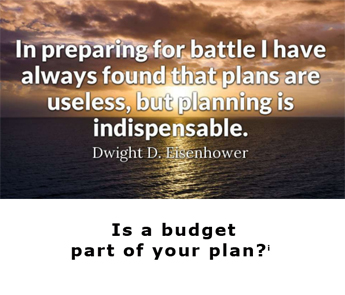If it wasn’t for people . . . leaders wouldn’t need to budget.
If you want to know what an organization is all about, whether you the “leader” is exercising leadership responsibilities well, just follow the money; check the budget, look at the financial statements. Where money is spent and where it is coming from can tell you volumes about how well an organization is fulfilling its purpose.
Would you believe that there actually are organizations that do not really budget, or they have a budget process that just doesn’t work? That casual attitude toward financial resources demonstrates a lack of planning and a sure recipe for failure. I was part of two organizations like that and despite my best efforts, one failed, but the other changed their process and it made all the difference in the world.
There is no need to go into the details of preparing and executing a budget, there are many resources available to help with financial planning and using financial statements to measure whether the organization is effective in executing a budget.
So why should you the “leader” care about your organization’s budget? Maybe we should start with the Bible. Jesus said, “Suppose one of you wants to build a tower. Will he not first sit down and estimate the cost to see if he has enough money to complete it?” Of course, these words are related to Kingdom building and discipleship, but the principle applies to any well-run organization or else our Lord would have never used this example. But the important message here is that “counting the cost” or budgeting should reflect the purpose and priorities of your life and of the organization in which you serve.
You the “leader” have an important responsibility here. If your organization doesn’t have a budget, then you haven’t solidly expressed the priorities of your organization regardless of where else those priorities may be stated. If you are not planning and executing to support the top priorities financially, you have no top priorities. Even in a volunteer organization, those people supporting your organization’s purpose need resources in order to execute. If spending financially in an organization is a free for all, you will probably never get the right things accomplished.
The budget should reflect where you anticipate the source of your financial support for a given period. Do you have the right customers? How about investors? Do your ministry constituents care enough to support your ministry financially? Are you serving your ministry constituents well? Perhaps you’re not planning to spend enough money on the sales force or the necessary tools to advertise and market. For a start-up business, are there resources available for product development, beta testing, and initial production? Are the budget lines adequate to take care of employees, your organization’s most precious resource? In my church, Crosspoint, they handle the financial support part of the ministry extremely well. The message is never heavy-handed and, it is not about money for the church, it is about the love for the Lord that compels people to return some of His resources for Kingdom purposes.
A key question is who is responsible for budget development and budget execution? If the organization has a board of directors, then they are ultimately responsible. If not, then the CEO or Lead Pastor in a church is responsible. In my view, you the “leader” must make sure a budget is prepared. Your Chief Financial Officer or a Director of Finance will do the hard preparation work, but you and the board are responsible for approving the annual budget and reviewing financial reports to determine the effectiveness of budget execution and management of resources. But remember, the budget is part of the greater planning process and if conditions change, then budget change will probably be necessary. Plans change, budgets change (maybe driven by the Lord’s voice), and as General of the Armies, Dwight D. Eisenhower said, “In preparing for battle I have always found that plans are useless, but planning is indispensable.” In other words, once the action begins, be ready to adjust.
Now for a deeper question. What are your priorities, and do they reflect a life motivated toward “eternity?” Does your checkbook and resource allocation reflect what is really important in your life? Do your priorities and your budget reflect a life focused on THE ONE? That would be Jesus and are you prepared to change your life according to His calling? Does your lifetime budget reflect the cost of discipleship?
i https://www.brainyquote.com/quotes/dwight_d_eisenhower_164720





